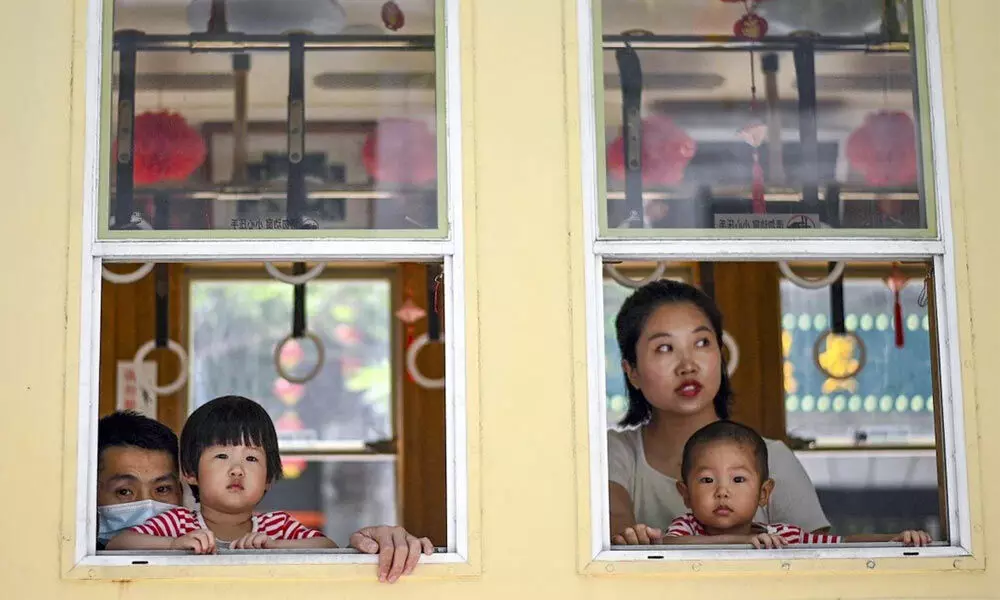Live
- Alexander Ostrovskiy: Perfect DJ Home Studio
- Chanchalguda Jail Officials Say They Haven't Received Bail Papers Yet, Allu Arjun May Stay in Jail Tonight
- BJP leaders present evidence of illegal voters in Delhi, urge EC for swift action
- Exams will not be cancelled: BPSC chairman
- Nagesh Trophy: Karnataka, T.N win in Group A; Bihar, Rajasthan triumph in Group B
- YS Jagan condemns the arrest of Allu Arjun
- Economic and digital corridors to maritime connectivity, India and Italy building vision for future, says Italian Ambassador
- SMAT 2024: Patidar's heroics guide Madhya Pradesh to final after 13 years
- CCPA issues notices to 17 entities for violating direct selling rules
- Mamata expresses satisfaction over speedy conviction in minor girl rape-murder case
Just In
Parents In China Hope That The Three-Child Policy Will Result In The Birth Of A Son


For some families in China, the three-child policy is another opportunity to try and have a boy. Photo: AFP
- The 35-year-old, who was born and reared in the countryside of Linyi in eastern China's Shandong province, just gave birth to her third child, a boy.
- She told that her family about the pregnancy and decided to keep it even if it was a girl.
The 35-year-old, who was born and reared in the countryside of Linyi in eastern China's Shandong province, just gave birth to her third child, a boy. The elders in Wang Huaiying's community were quite concerned about her bearing a male child. Even during China's one-child policy, families she grew up with would typically have three or four children in the hopes of having a male.
The boy will have two elder sisters, and Wang said she wanted a third child partially to fulfill the family's customary desire for a son. She stated that it's a lie to suggest that she is unconcerned about the baby's gender that her generation, on the other hand, does not care as much as their parents, who are still quite concerned. She told that her family about the pregnancy and decided to keep it even if it was a girl.
While changing attitudes among China's younger generations, numerous communities still favour males, and for some families, the recently imposed three-child policy provides another opportunity to try for a boy. The Chinese government modified its 2016 two-child policy in May, loosening its 35-year-old one-child restriction. Although exact policy specifics have not been revealed, parents can now have three children without fear of paying fines.
China is in the midst of a demographic crisis, with a growing increasing population and the lowest birth rate since the Great Famine 60 years ago. The three-child policy aims to encourage families to have more children.
Moreover, there was widespread skepticism about the policy's capacity to have a significant impact on Chinese demographics. Financial demands, strong job obligations, and the high pressures of child-rearing are deterring many families, particularly in metropolitan areas, from having even one child, let alone three. However, in more cheap parts of China, typically rural areas, the three-child policy offers a chance to have a much-desired son – especially for parents who already have two daughters.
The recent studies conducted by the National Bureau of Statistics research teams in three cities in the provinces of Zhejiang, Jiangsu, and Shandong revealed that rural residents are more ready to have three children. Traditional views, such as the more children, the greater the blessing, may be more frequently shared there.
Nearly 12% of rural inhabitants in Yancheng, Jiangsu province, stated they wanted a third child, which is roughly 9% more than those in urban regions. This percentage was greater by roughly 7% and 3% in Jinan, Shandong province, and Jinhua, Zhejiang province, respectively.
Shi Wei, a 20-year-old mother expecting her third child, is one of these people. She began praying for a son after learning she was pregnant with her third kid in April. She already has two daughters, and the woman from Luzhou, Sichuan province in southwest China, has been documenting her third pregnancy experience on the short video platform Douyin, with practically every post labeled as she wants a boy.
Meanwhile, in 2003, the Chinese government banned foetal sex identification to protect girls from being aborted. However, many people discovered loopholes, such as having their DNA tested in Hong Kong to determine their gender. The sex ratio in China reflects the country's preference for boys. In China, for every 100 females born, 111.3 boys are born. In 2004, the ratio reached a high of 121 male births per 100 female births. The UN Population Fund recommends a sex ratio of 104-106 boys for every 100 girls in populations that do not control their births.

© 2024 Hyderabad Media House Limited/The Hans India. All rights reserved. Powered by hocalwire.com






